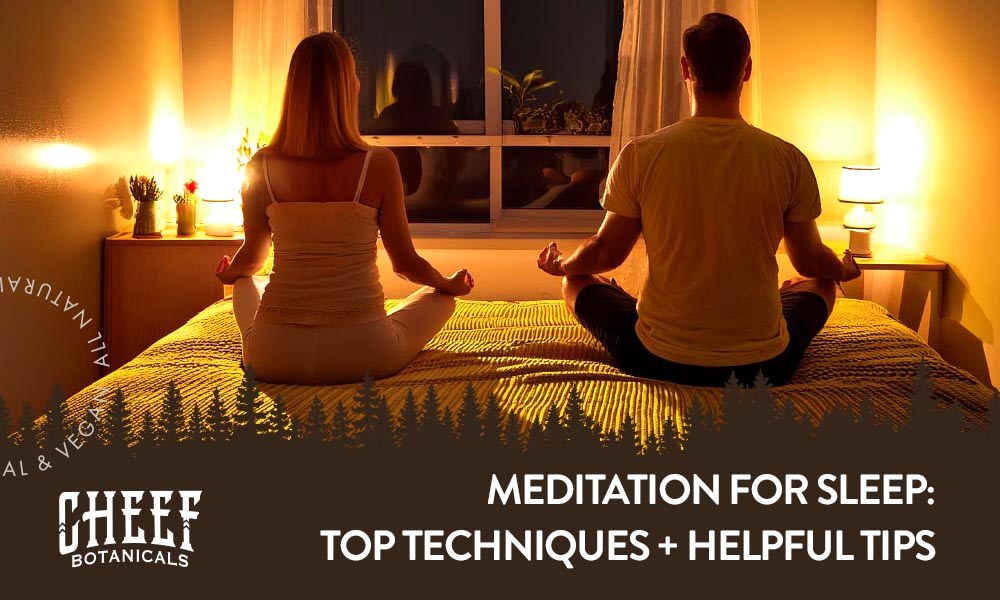Do you ever find it difficult to fall asleep despite feeling tired? Meditation for sleep might be the answer. This practice helps calm your mind, promotes natural relaxation, and prepares your body for a restful night. By focusing on your breath and letting go of anxious thoughts, you can create the perfect environment for sleep.
This post explores how meditation for sleep works, the best techniques to try, and helpful tips to enhance your sleep meditation practice. Let's find out how to improve your sleep quality with these simple and effective methods.
How Can Meditation Promote Sleep?
Meditation for sleep helps calm your mind and body. When you practice sleep meditation, you focus on your breath and clear away bothersome thoughts. This mindfulness meditation may reduce stress and promote relaxation, making it easier to fall asleep. Taking deep breaths signals your body to relax, which may improve sleep quality.
Studies show that meditation naturally increases melatonin, a hormone that helps you sleep, and lowers cortisol, the stress hormone. Techniques like guided meditation and nature sounds can enhance your sleep meditation practice. These methods help you fall asleep faster and stay asleep longer, leading to more restorative sleep. Adding meditation to your bedtime routine should help you develop better sleep habits and enjoy a restful night.
Various Meditation Practices
There are many ways to use meditation for better sleep. Different techniques may help you relax and fall asleep faster. Let's explore some of the most effective meditation practices for improving sleep quality.
Mindfulness Practices
Mindfulness meditation involves focusing on the present. You create a sense of calm by paying attention to your breath and letting go of anxious thoughts. This helps reduce stress and promotes relaxation, supporting sleep quality.
Regular mindfulness meditation can also help develop better sleep habits, making it easier to fall and stay asleep. Techniques like focusing on deep breaths or body scans can make this practice even more effective. With consistent practice, mindfulness meditation can lead to more restful sleep and a peaceful mind.

Guided Sessions
Guided meditation sessions are another effective way to improve sleep. These sessions involve listening to a guide who helps you relax and focus your mind. Guided meditation can include nature sounds, calming music, or specific instructions to help you unwind.
These sessions can be especially helpful if you struggle with falling asleep or staying asleep. Guided meditations for sleep are designed to reduce stress and promote relaxation, making it easier to drift off.
Qigong Practices
Qigong combines deep breathing, slow movements, and focused intention to balance energy. This practice promotes relaxation and reduces stress, which may improve sleep quality. Focusing on deep breaths and gentle movements calms the mind and body.
Qigong exercises often involve visualizing energy flow, which helps to release tension. Adding Qigong to your routine can support better sleep habits and lead to restful sleep. Practicing this before bed helps you unwind and prepares your body for a refreshing night's sleep.
Tai Chi Techniques
Tai Chi uses slow, flowing movements and deep breathing to help you relax and sleep better. This practice focuses on maintaining a calm and peaceful mind. The gentle, continuous movements help reduce stress and increase mindfulness.
By concentrating on each movement and your breath, Tai Chi helps create a state of tranquility. This practice can support proper sleep habits and make it easier to fall asleep.
Yoga Practices
Yoga combines physical postures, deep breathing, and meditation to promote relaxation and reduce stress. This practice helps improve sleep quality by calming the mind and relaxing the body. Specific yoga poses, like child's pose and savasana, are particularly effective for sleep.
Deep breathing exercises in yoga, such as pranayama, help release tension and prepare your body for rest. Practicing yoga before bed can lead to better sleep habits and deeper, more restful sleep. Including mindfulness and guided meditation in your yoga practice can further enhance your sleep meditation routine.
Yoga Nidra Techniques
Yoga Nidra, also known as yogic sleep, is a technique that promotes deep relaxation and restorative sleep. In a Yoga Nidra session, you lie down comfortably and listen to a guided meditation. This practice helps you enter a state between wakefulness and sleep, which can improve sleep quality.
It also reduces stress and tension by focusing on breathing and body awareness. This meditation practice may help you fall asleep faster and enjoy deeper sleep.

Additional Benefits of Meditation
Meditation offers many benefits beyond improving sleep quality. It may boost various parts of your well-being, making it a valuable daily practice. Here are some key benefits:
- May Ease Stress. Meditation helps ease stress by calming your mind and body. Focusing on your breath and the present moment may reduce nervous thoughts and anxiety. This relaxation technique lowers cortisol levels, helping you relax more deeply.
- Promotes a Positive Mental Outlook. Regular mindfulness meditation may promote a positive mental outlook. It encourages you to focus on the present moment and appreciate the here and now. This may help reduce negative thoughts and enhance your overall mood, making you feel more positive.
- Supports Pain Management. Meditation supports pain management by helping you focus on your breath and body awareness. Techniques like guided meditation and deep breaths may ease discomfort. Consistent meditation practice helps you manage and cope with pain, resulting in a better quality of life.
Meditation Methods
There are many ways to meditate. Consider these categories of meditation techniques as a starting point to explore the practices and differences among some of the main options. Here are some effective methods to try:
- Basic Meditation. Sit comfortably and focus on your breath. If your thoughts wander, gently bring your focus back to your breathing. This meditation practice helps you stay present and promotes relaxation.
- Focused Meditation. This method involves focusing on a single object, sound, or thought. You might concentrate on a candle flame, the sound of waves, or a concept like compassion. Focused meditation helps improve concentration and mindfulness.
- Activity-Oriented Meditation. Combine meditation with activities you enjoy, like walking or painting. This type of meditation allows you to get "in the zone" and experience flow, which quiets the mind and helps you stay present.
- Mindfulness Meditation. This method emphasizes being present in the moment. Focus on your breath, sensations in your body, or emotions without judging them. This technique helps minimize stress and anxiety by keeping you grounded.
- Spiritual Meditation. This method can involve meditating on a question or simply clearing your mind. Spiritual meditation can be a deeply personal practice that enhances your connection to your inner self or a higher power.
Sample Sleep Meditation
Here's a simple sleep meditation to help you relax and drift off to sleep. Find a quiet space and lie down comfortably in your bed.
- Start with Deep Breaths. Breathe deeply, inhaling slowly through your nose and exhaling through your mouth. Focus on the rhythm of your breath and let go of any tension.
- Body Scan. Gradually scan your body from head to toe, paying attention to any areas of tension. As you breathe out, imagine the tension melting away, leaving you feeling relaxed.
- Visualization. Imagine a peaceful scene, like a quiet beach or a tranquil forest. Visualize yourself there, feeling the gentle breeze and hearing the soothing sounds of nature.
- Affirmations. Repeat calming affirmations to yourself, such as "I am relaxed," "I am at peace," or "I am ready for restful sleep."
- Stay Present. If your thoughts start to wander, gently bring your focus back to your breath and the present moment.
This sleep meditation may help you sleep faster and enjoy a deeper, more restful sleep. Incorporate it into your nightly routine to build better sleep habits.
Are There Any Risks Associated with Meditation?
Meditation for sleep is safe for most people, but there can be some risks. Some might feel more anxious or upset when starting a new meditation practice. If you have a history of trauma, certain meditation techniques might bring up tough memories. It's important to choose a method that feels comfortable for you.
Always listen to your body and mind, and stop if you feel any discomfort. Talking to a healthcare professional before starting can help make sure the meditation practice is right for you.
When Should You Meditate Before Sleeping?
The best time to meditate before sleeping is about 30 minutes to an hour before bed. This gives your body and mind time to relax and transition smoothly into sleep. Adding a guided meditation or mindfulness meditation to your bedtime routine can improve sleep quality. Don't meditate too close to bedtime, as it might keep you awake.
Try different times to see what works best for you. Consistency is key, so meditate at the same time each night to develop better sleep habits and enjoy more restful sleep.
What Should The Environment Be Like While Meditating?
Creating the right environment for meditation helps you relax and focus better. Find a quiet and comfortable place where you won't be disturbed. Dim the lights or use soft light for a calming effect.
You can also enhance your meditation practice by listening to soothing noises, such as nature sounds or gentle music. Make sure your meditation space is clean and clutter-free to promote tranquility and improve your overall meditation experience.

What Can Complement Meditation and Sleep?
Enhancing your sleep meditation with other practices can enhance your sleep quality and make it easier to fall asleep. Here are some effective ways to complement your sleep meditation practice:
- Establishing a Regular Sleep Routine. Keeping a consistent sleep schedule by going to bed and waking up at the same time daily helps regulate your body's internal clock, promoting better sleep habits and more restful sleep.
- Creating a Relaxing Sleep Environment. Make your bedroom sleep-friendly by keeping it dark, cool, and quiet. Consider using blackout curtains, earplugs, or a white noise machine to block out distractions.
- Limiting Screen Time Before Bed. Turn off screens at least an hour before bed. The blue light from phones can mess with melatonin production, making it difficult to sleep.
- Utilizing Hemp Products for Sleep. Hemp products can promote relaxation and improve sleep quality. Consider using hemp oils or gummies to support your sleep meditation practice. Here at Cheef, we specialize in hemp products and offer some great options to promote sleep, like our CBD + CBN gummies for sleep or our THC + CBN Gummies for sleep.
- Drinking Herbal Teas. Chamomile or lavender herbal teas can calm your mind and body, making it easier for you to fall asleep.
- Consuming Blue Lotus Gummies or Tea. Blue Lotus products can help promote relaxation and enhance your sleep meditation practice. Cheef Botanicals offers Blue Lotus Gummies that combine Blue Lotus with Delta-9 THC, Cannabinol (CBN), and Cannabigerol (CBG) to soothe stress and promote restful sleep.
- Using Aromatherapy with Essential Oils. Essential oils like lavender or eucalyptus create a calming environment, helping you build better sleep habits.
- Avoiding Caffeine and Heavy Meals Before Bed. Caffeine and heavy meals can disrupt your sleep. Avoid consuming them a few hours before bedtime to promote better sleep quality.
- A Warm Baths or Showers in the Evening. Having a warm bath or shower helps relax your muscles and get your body ready for sleep. This routine complements your sleep meditation practice and makes it easier to drift off.
Final Thoughts: Meditation for Sleep
Meditation can really improve your nightly routine. Techniques like mindfulness meditation and guided meditation can boost your sleep quality and allow you to enjoy more restful nights. Creating better sleep habits and a relaxing sleep environment is also important for quality sleep.
As we've discussed, combining meditation with other sleep aids like drinking herbal teas, using hemp products, and limiting screen time can help you fall asleep and stay asleep. Cheef Botanicals' Blue Lotus Gummies are great for soothing stress and promoting relaxation.
Use this guide to try different meditation methods and find what works best. With regular practice, you can achieve deep sleep and wake up feeling refreshed. Remember, a good night's sleep starts with a calm mind and a peaceful environment.




![Restless Sleep Guide [Symptoms, Causes, & Suggested Solutions]](http://cheefbotanicals.com/cdn/shop/articles/Restless-Sleep_53d3942f-e1e4-4e46-983d-1945436b9d67.jpg?v=1747177508&width=1000)

Leave a comment
This site is protected by hCaptcha and the hCaptcha Privacy Policy and Terms of Service apply.